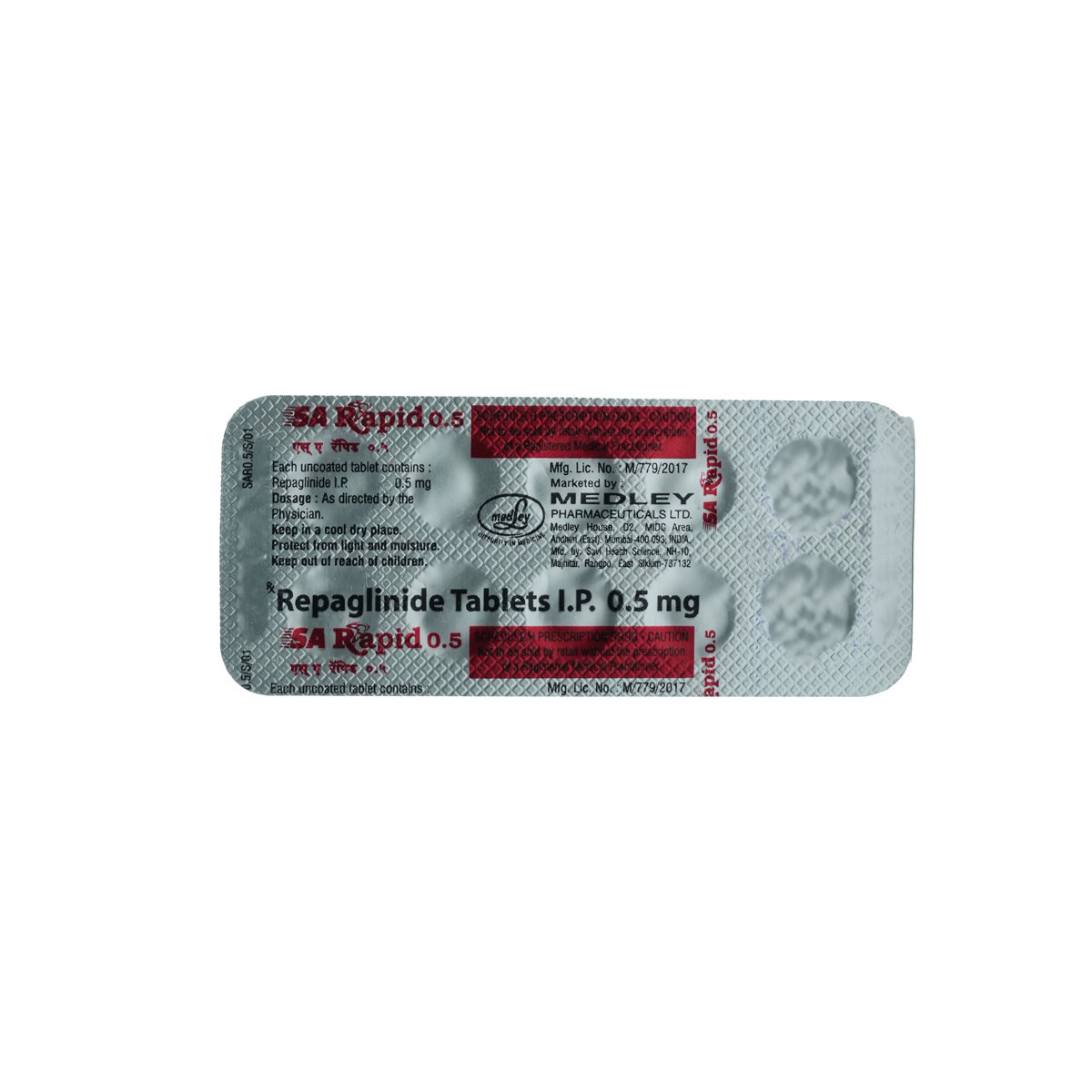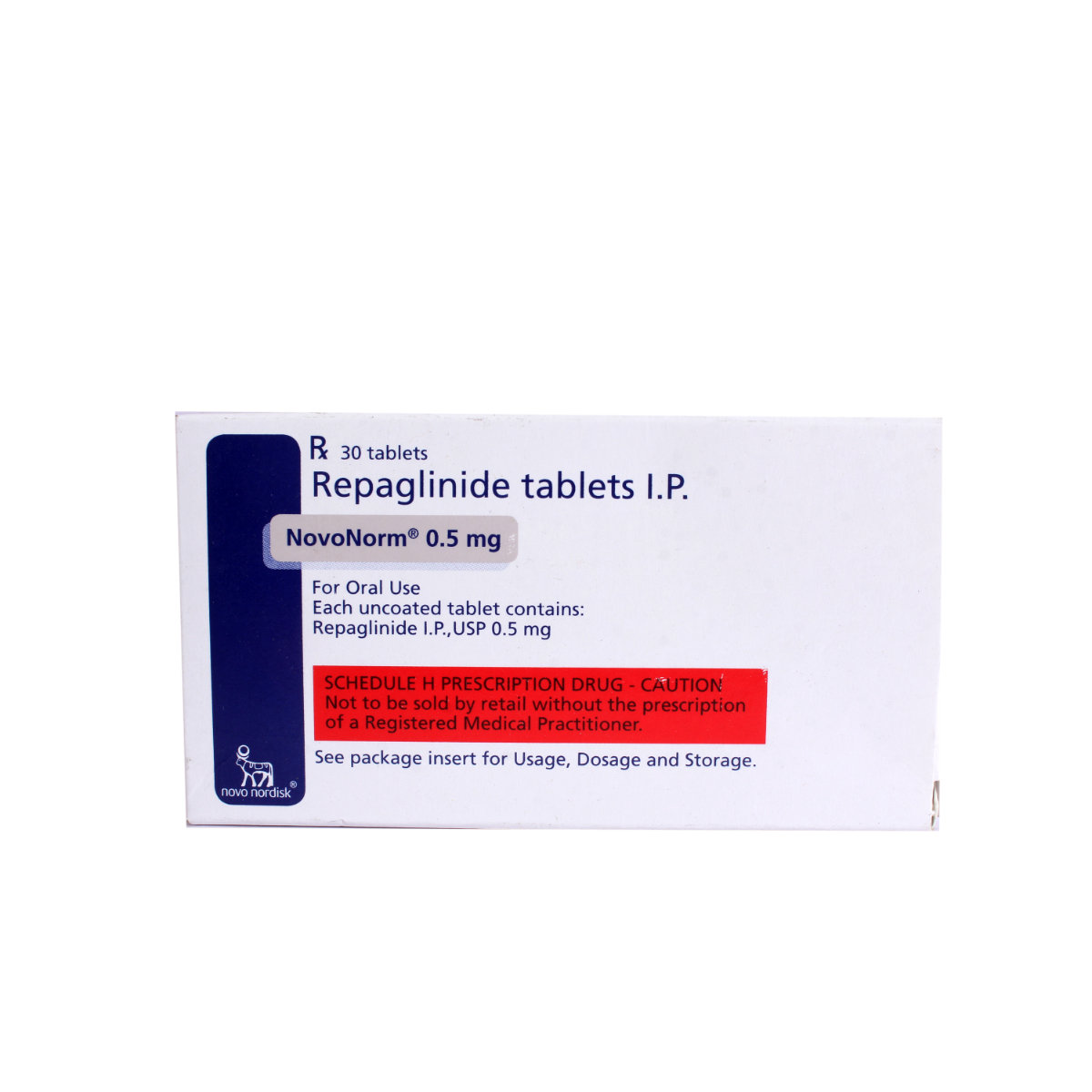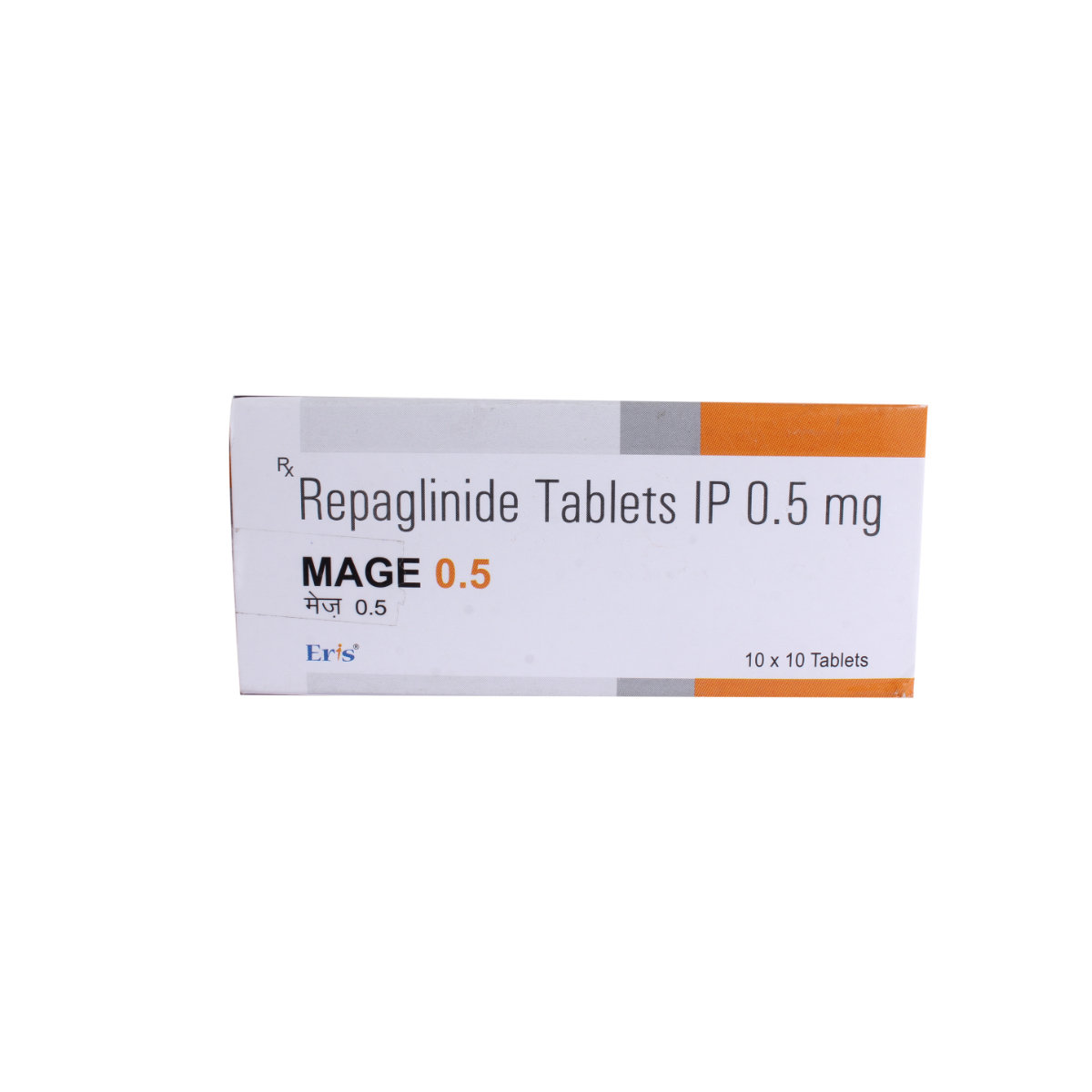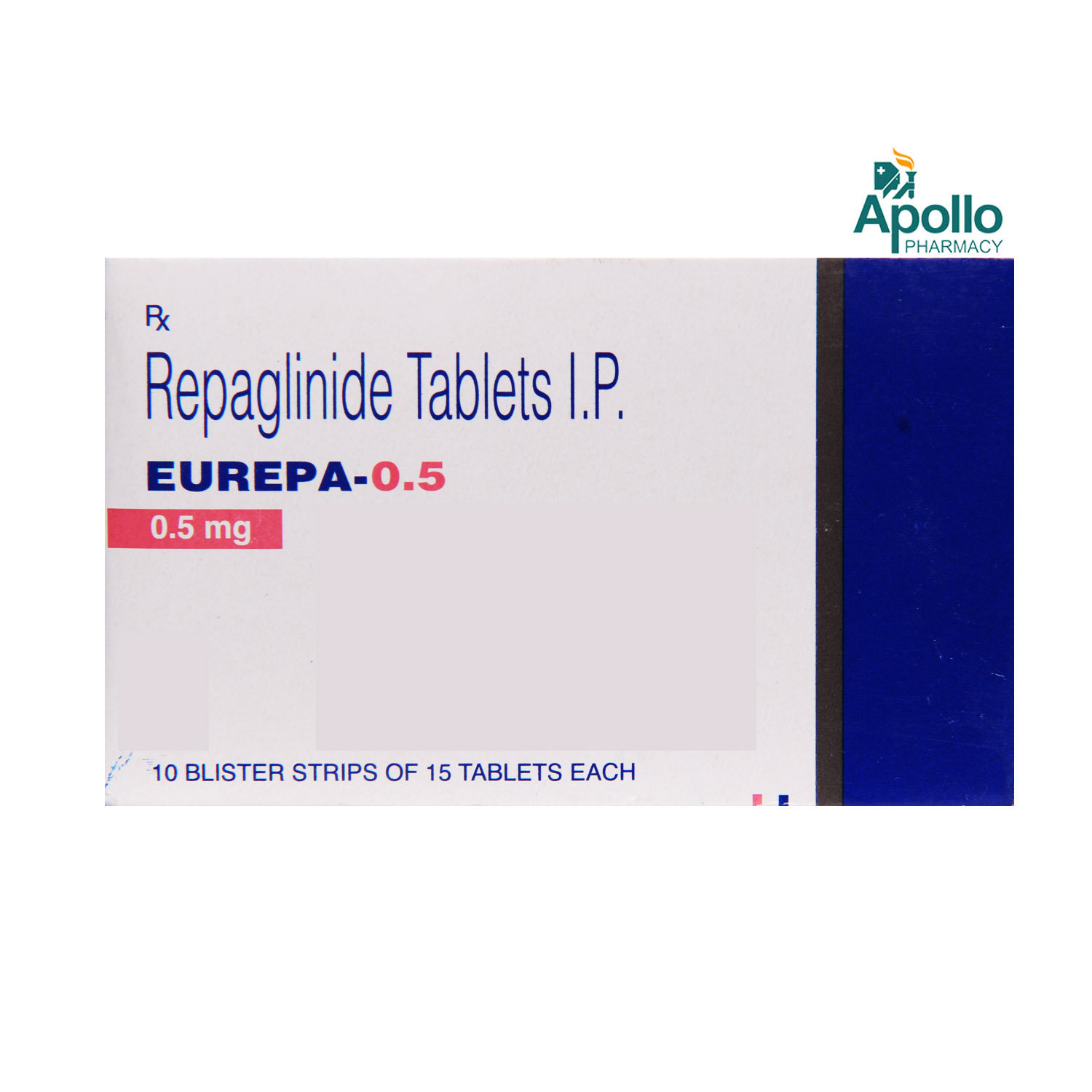- Home
- Shortepa 0.5 mg Tablet 15's
Shortepa 0.5 mg Tablet 15's Substitute
Shortepa 0.5 mg Tablet 15's Substitute
Medicine Composition:
REPAGLINIDE-0.5MGAll Substitutes & Brand Comparisons
RX
Out of StockReepag 0.5 mg Tablet 10's
Johnlee Pharmaceuticals Pvt Ltd
₹40
(₹4.0 per unit)
52% CHEAPERRX
Out of StockEuglinide 0.5 Tablet 10's
Jixon Pharmaceuticals Pvt Ltd
₹55
(₹4.95 per unit)
41% CHEAPERRX
Reglinide-0.5 Tablet 10's
Evarite Healthcare
₹56
(₹5.04 per unit)
40% CHEAPERRX
Q Repa 0.5 mg Tablet 10's
Q Check Pharmaceuticals
₹60
(₹5.4 per unit)
35% CHEAPERRX
Mlrepa 0.5 mg Tablet 15's
MEDICAMEN BIOTECH LTD
₹98
(₹5.88 per unit)
30% CHEAPERRX
Lunch ON 0.5 mg Tablet 10's
Illumin Pharma
₹65.5
(₹5.9 per unit)
30% CHEAPERRX
RESTRICT 0.5MG TABLET
East West Pharma India Pvt Ltd
₹69.5
(₹6.26 per unit)
25% CHEAPERRX
Zrepag-0.5 Tablet 10's
Daylon healthcare pvt Ltd
₹75
(₹6.75 per unit)
19% CHEAPERRX
SA Rapid 0.5mg Tablet 10's
Medley Pharmaceuticals Ltd
₹79.5
(₹7.16 per unit)
15% CHEAPERRX
Out of StockGlugrip 0.5 MG Tablet 10's
Hospimax Healthcare Pvt Ltd
₹83.5
(₹7.52 per unit)
10% CHEAPERRX
Premeal 0.5mg Tablet 10's
Elsker Life Science
₹84
(₹7.56 per unit)
10% CHEAPERRX
Novonorm 0.5 mg Tablet 15's
Novo Nordisk India Pvt Ltd
₹136
(₹8.16 per unit)
3% CHEAPERRX
Mage 0.5 mg Tablet 10's
Eris Life Sciences Ltd
₹100
(₹9.0 per unit)
6% COSTLIERRX
Eurepa 0.5 Tablet 15's
Torrent Pharmaceuticals Ltd
₹169
(₹10.14 per unit)
20% COSTLIERRX
Repanew 0.5 Tablet 10's
DCM Pharma Pvt Ltd
₹112.5
(₹11.25 per unit)
33% COSTLIER

When Should You Consider Switching from Shortepa 0.5 mg Tablet 15's?
Patients may explore substitutes in the following scenarios:
- High monthly cost of Shortepa 0.5 mg Tablet 15's
- Non-availability in local pharmacies
- Generic recommendation by a doctor
- Side effects or better tolerability with alternatives
What to Know Before Switching
Before you switch from Shortepa 0.5 mg Tablet 15's to another medicine, here are some important points to keep in mind:
Same salt, different brands:
Most substitutes contain the same active ingredient - REPAGLINIDE-0.5MG, but the fillers, coating, or manufacturing quality may vary slightly.
Consult your doctor first:
Even if the salt is the same, your doctor can confirm if the substitute is right for your condition, dosage, and health history.
Watch out for allergies or reactions:
Some people may react differently to certain brands due to inactive ingredients. If you notice any side effects, inform your doctor immediately.
Price ≠ effectiveness:
A lower-priced substitute doesn't mean it's less effective. Many generic medicines work just as well as branded ones.
Check the dosage form and strength:
Always match the substitute’s strength (e.g., 5mg, 10mg) and form (tablet, capsule, syrup) with what your doctor prescribed.
Uses
Shortepa 0.5 mg Tablet 15's is used in the treatment of Type 2 Diabetes Mellitus. The detailed use of Shortepa 0.5 mg Tablet 15's is as follows:
- Type 2 Diabetes Mellitus (T2DM): Shortepa 0.5 mg Tablet 15's is used to help control blood sugar levels in adults with T2DM. It’s especially useful for managing post-meal (postprandial) glucose spikes.
Medicinal Benefits
- Shortepa 0.5 mg Tablet 15's belongs to the group of medicines called “anti-diabetic” indicated in the treatment of type 2 diabetes or non-insulin-dependent diabetes (NIDDM).
- This medicine is primarily prescribed for individuals whose blood sugar levels are high and cannot be controlled by diet and exercise alone.
- Shortepa 0.5 mg Tablet 15's consists of Repaglinide, which belongs to a class of meglitinide that works by increasing the amount of insulin released by the pancreas.
- Shortepa 0.5 mg Tablet 15's starts acting quickly to control blood sugar levels immediately after a meal.
- Shortepa 0.5 mg Tablet 15's may be advised with or without other medications, along with diet and exercise to control blood sugar levels.
FAQs
The substitutes of Shortepa 0.5 mg Tablet 15's contain the same active salt(s) - REPAGLINIDE-0.5MG. However, they may differ in price, manufacturing quality, and inactive ingredients. Speak to your doctor to find a suitable option.
Switching to a generic substitute medicine in the place of Shortepa 0.5 mg Tablet 15's is often possible if it has the same salt, strength, and dosage form. But always check with your doctor before making any changes to your medication.
Generics versions of Shortepa 0.5 mg Tablet 15's are typically more affordable because they don’t include the original brand's research, development, and marketing costs. They contain the same active ingredient and are approved for safety and effectiveness.
Most people don’t notice any difference. However, some may react to different fillers or coatings. If you notice any unusual symptoms after switching, consult your doctor.
Make sure the new medicine has the same active salt, strength, dosage form. Always confirm the change with your doctor or pharmacist.
Substitutes of Shortepa 0.5 mg Tablet 15's meet the same safety and efficacy standards as Shortepa 0.5 mg Tablet 15's, but small differences in absorption or formulation can exist. A doctor can help you choose the right one for your needs.
Yes. Substitutes of Shortepa 0.5 mg Tablet 15's may vary in color, size, or shape due to differences in manufacturing and branding, but this does not affect how they work.
Yes, it’s generally safe to switch between multiple substitutes of Shortepa 0.5 mg Tablet 15's if they have the same salt and strength. However, always inform your doctor so they can monitor how your body responds.
Yes, many people safely use substitutes of Shortepa 0.5 mg Tablet 15's for long-term treatment. Just ensure it’s done under medical supervision.
If your symptoms stay under control or lab results remain stable, the substitute for Shortepa 0.5 mg Tablet 15's is likely working well. Regular follow-ups with your doctor are important.
Absolutely. Even with the same salt, small differences can affect how your body responds when switching from Shortepa 0.5 mg Tablet 15's to its substitute. Always consult your doctor before switching.
Shortepa 0.5 mg Tablet 15's is used for the management and treatment of type 2 diabetes, especially in persons whose sugar levels are too high and cannot be controlled only by dieting and exercising.
Shortepa 0.5 mg Tablet 15's contains Repaglinide that works by increasing the amount of insulin released by the pancreas, which prevents blood glucose from rising very high after meals.
Hypoglycemia refers to low blood sugar levels, and it is one of the side effects of Shortepa 0.5 mg Tablet 15's. Hypoglycemia can occur if you miss or delay your food, drink alcohol, over-exercise, or take other antidiabetic medicine along with this medicine. It is important to monitor blood sugar levels regularly.
Type-2 diabetes generally does not affect healthy children and teens, but it may affect children who are obese, which is also known as Childhood Obesity.
If a person is getting unusually thrust or passing urine more frequently than normal while taking Shortepa 0.5 mg Tablet 15's, they should tell their doctor, as it may be a sign that there is too much sugar in their blood and treatment needs to be adjusted. It may also be because of dehydration, as Shortepa 0.5 mg Tablet 15's can lead to loss of fluids. Increase intake of fluids; if even then you feel thirsty, please consult your doctor.
Your doctor may suggest you go for a regular test for sugar (glucose) in your blood or urine to monitor if diabetes has controlled or not.
Diabetes is a chronic medical condition that means lifelong, so its treatment should also continue for the whole life, so keep taking Shortepa 0.5 mg Tablet 15's unless your doctor advises you to stop the medicine.
Shortepa 0.5 mg Tablet 15's should be used with caution in heart, kidney or liver diseases, breathing problems, blood disorders, dehydration, alcohol use, foot ulcers, nerve damage, low blood pressure and severe infections. Shortepa 0.5 mg Tablet 15's is contraindicated in patients with renal impairment and diabetic ketoacidosis.
If you feel that your blood sugar level is going down and you are feeling weak, immediately eat sugar candies or drink sugary beverages. It will help to balance the blood sugar level in your body. So, it is advisable to keep sugar candies with you.
Shortepa 0.5 mg Tablet 15's is pregnancy category C drug. As the data around the use of Shortepa 0.5 mg Tablet 15's in pregnant women is limited, the use of Shortepa 0.5 mg Tablet 15's in pregnancy is restricted. It is highly recommended to consult your doctor before taking this drug in case you are pregnant.
Shortepa 0.5 mg Tablet 15's begins working 30 minutes after it is taken.
Shortepa 0.5 mg Tablet 15's is rapidly absorbed and has a half-life of less than 60 minutes.
You are recommended not to consume alcohol along with the Shortepa 0.5 mg Tablet 15's to avoid unpleasant side effects. Also, alcohol may affect blood glucose levels in patients with diabetes.
Shortepa 0.5 mg Tablet 15's may be used as monotherapy (supplemental to exercise and diet control) or combined with other antihyperglycemic agents. However, it should only be taken if prescribed by the doctor.
No, you should not breastfeed while taking Shortepa 0.5 mg Tablet 15's without consulting your doctor. Although it is unlikely to pass into breast milk significantly, it can cause low blood sugar in breastfed infants.
Taking clopidogrel and Shortepa 0.5 mg Tablet 15's together may cause a drop in blood sugar levels, known as hypoglycemia. If you are taking clopidogrel and need to take Shortepa 0.5 mg Tablet 15's, let your doctor know; your healthcare provider may guide an alternative approach.
Shortepa 0.5 mg Tablet 15's should be taken before or up to 30 minutes before each main meal.
Do not use this medicine if you are under 18 years of age.
No, it is a prescription medication and should be taken only if prescribed by the doctor.
Common side effects of Shortepa 0.5 mg Tablet 15's may include headache, stomach pain, a sign of a common cold, diarrhoea, joint pain, and back pain. Most of these side effects do not require medical attention and gradually resolve over time. However, if the side effects persist, contact your doctor.
Do not take other medicines when you take Shortepa 0.5 mg Tablet 15's unless they have been discussed with your doctor. Limit or avoid the consumption of alcohol. You may want to limit your consumption of grapefruit and grapefruit juice during treatment with repaglinide.
Store in a cool and dry place away from sunlight. Keep Shortepa 0.5 mg Tablet 15's out of sight and reach of children.
Shortepa 0.5 mg Tablet 15's contains Shortepa 0.5 mg Tablet 15's, an antidiabetic drug in the class of medications known as meglitinides.
No, it is not recommended to treat type 1 diabetes mellitus.
Shortepa 0.5 mg Tablet 15's should be continued even if you feel better, without consulting your doctor as your sugar level keeps changing. If you stop taking Shortepa 0.5 mg Tablet 15's abruptly, it may increase your sugar levels, which could further increase the risk of eyesight loss (retinopathy), kidney (nephropathy), and nerve damage (neuropathy).
Diabetes mellitus 2, also known as adult-onset diabetes, is a metabolic disease that causes high blood sugar levels.
Your driving ability may be affected if your blood sugar levels are too high or too low. Do not drive or operate machinery if you also experience blurred vision, dizziness or drowsiness due to extremely low or high blood sugar.
Buy best Diabetics products by
Torrent Pharmaceuticals Ltd
Intas Pharmaceuticals Ltd
Eris Life Sciences Ltd
Micro Labs Ltd
Lupin Ltd
Sun Pharmaceutical Industries Ltd
Mankind Pharma Pvt Ltd
Alkem Laboratories Ltd
Lloyd Healthcare Pvt Ltd
Cipla Ltd
Macleods Pharmaceuticals Ltd
Abbott India Ltd
Primus Remedies Pvt Ltd
Glenmark Pharmaceuticals Ltd
Aristo Pharmaceuticals Pvt Ltd
Dr Reddy's Laboratories Ltd
USV Pvt Ltd
La Renon Healthcare Pvt Ltd
Wockhardt Ltd
Emcure Pharmaceuticals Ltd
Fusion Health Care Pvt Ltd
Ajanta Pharma Ltd
Ipca Laboratories Ltd
Corona Remedies Pvt Ltd
Alembic Pharmaceuticals Ltd
East West Pharma India Pvt Ltd
Hbc Life Sciences Pvt Ltd
Eswar Therapeutics Pvt Ltd
Zydus Healthcare Ltd
Alteus Biogenics Pvt Ltd
Elbrit Life Sciences Pvt Ltd
Medley Pharmaceuticals Ltd
Mitoch Pharma Pvt Ltd
Ranmarc Labs
Sinsan Pharmaceuticals Pvt Ltd
Verse Lifesciences
Msn Laboratories Pvt Ltd
Nirvana India Pvt Ltd
Tas Med India Pvt Ltd
Akumentis Healthcare Ltd
Arkas Pharma Pvt Ltd
Unison Pharmaceuticals Pvt Ltd
Leeford Healthcare Ltd
Sanofi India Ltd
Acmedix Pharma Llp
Q Check Pharmaceuticals
Blue Cross Laboratories Pvt Ltd
Neucure Lifesciences Pvt Ltd
Xemex Life Sciences
Anthem Bio Pharma
Spectra Therapeutics Pvt Ltd
Sydmen Life Sciences Pvt Ltd
Talent India Pvt Ltd
Aareen Healthcare Pvt Ltd
Alvio Pharmaceuticals Pvt Ltd
Diacardus Pharmacy Pvt Ltd
Edoc Life Sciences Pvt Ltd
Jubilant Lifesciences Ltd
Stature Life Sciences Pvt Ltd
Systopic Laboratories Pvt Ltd
Franco Indian Pharmaceuticals Pvt Ltd
Indoco Remedies Ltd
Panacea Biotec Ltd
Sanz Pharmaceuticals
Shrrishti Health Care Products Pvt Ltd
Akesiss Pharma Pvt Ltd
Hicxica Formulations Pvt Ltd
Lividus Pharmaceuticals Pvt Ltd
Novo Nordisk India Pvt Ltd
Capital Pharma
Elinor Pharmaceuticals (P) Ltd
Remedy Life Sciences Pvt Ltd
Saan Labs
Zydus Cadila
Biocon Ltd
Eli Lilly and Company (India) Pvt Ltd
Lippon Pharma Pvt Ltd
MERAKI HEALTH
Eysys Pharmaceutical Pvt Ltd
Koye Pharmaceuticals Pvt Ltd
Morepen Laboratories Ltd
Atos Lifesciences Pvt Ltd
Erinyle Health Care Pvt Ltd
LSD Pharmaceuticals
MEDICAMEN BIOTECH LTD
Azkka Pharmaceuticals Pvt Ltd
Converge Biotech Pvt Ltd
Knoll Healthcare Pvt Ltd
Elder Pharmaceuticals Ltd
FDC Ltd
Heal (India) Laboratories Pvt Ltd
Wallace Pharmaceuticals Pvt Ltd
Jarun Pharmaceuticals Pvt Ltd
Lincoln Pharmaceuticals Ltd
Opsis Care Lifesciences Pvt Ltd
Vasu Organics Pvt Ltd
Arica Pharmaceutical Pvt Ltd
CADOMAX HEALTHCARE PVT. LTD
Cadomed Pharmaceuticals India Pvt Ltd
Daylon healthcare pvt Ltd









